The owners of Metz Culinary Management recognized a need in Florida to provide meals to organizations and businesses that require large quantities of food, especially considering the significant growth in Florida’s senior population.
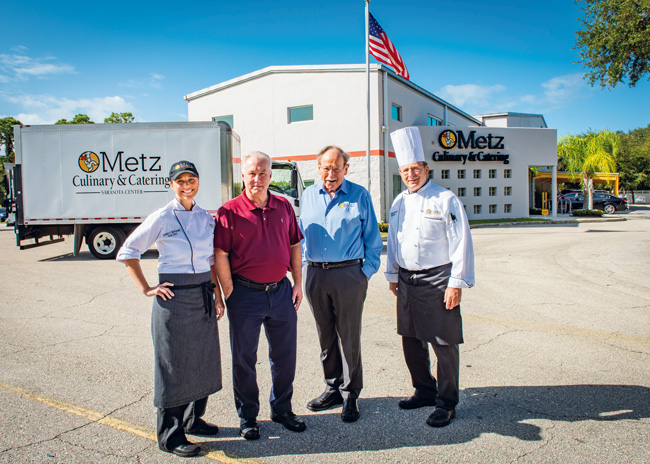 The Metz Culinary & Catering team, from left: Lyndsy McDonald, Nello Allegrucci, John Metz Sr. and Dan Thompson.Meals produced at the three-year-old Metz Culinary & Catering in Sarasota, Fla., serve seniors at congregate housing facilities, in adult daycare centers and in private homes in Florida, Colorado, and other southeast and mid-Atlantic states. The center’s child nutrition division prepares hot meals to children in after-school programs and for organizations such as Feeding America in Tampa, Fla. The center also serves corporate dining clients at offices and events such as the 2019 World Rowing Championship in Sarasota, during which Metz provided 254,000 meals in 14 days. Other clients include the Red Cross and other groups who provide emergency meals to municipal workers, and organizations such as Manatee Meals on Wheels Plus, Mid-Florida Community Services, Saint Vincent de Paul and Senior Friendship Center.
The Metz Culinary & Catering team, from left: Lyndsy McDonald, Nello Allegrucci, John Metz Sr. and Dan Thompson.Meals produced at the three-year-old Metz Culinary & Catering in Sarasota, Fla., serve seniors at congregate housing facilities, in adult daycare centers and in private homes in Florida, Colorado, and other southeast and mid-Atlantic states. The center’s child nutrition division prepares hot meals to children in after-school programs and for organizations such as Feeding America in Tampa, Fla. The center also serves corporate dining clients at offices and events such as the 2019 World Rowing Championship in Sarasota, during which Metz provided 254,000 meals in 14 days. Other clients include the Red Cross and other groups who provide emergency meals to municipal workers, and organizations such as Manatee Meals on Wheels Plus, Mid-Florida Community Services, Saint Vincent de Paul and Senior Friendship Center.
The culinary center occupies a site that once housed a 12,000-square-foot manufacturing facility that was gutted and rebuilt inside the building’s shell to become a culinary center. The company also occupies a 5,000-square-foot administrative space that is adjacent to the original warehouse. Located near two access roads to Interstate 75, a main thoroughfare in Florida and a hurricane evacuation route, the center is hurricane-proofed inside and outside for winds greater than 175 mph and water penetration, which this area in Florida frequently experiences.
“We have a large-capacity generator that is fueled by diesel fuel that can run nonstop on complete power for two weeks,” says Dan Thompson, general manager of the Metz Culinary and Catering Center. This is Thompson’s first foodservice culinary project; he previously worked for 25 years at food and beverage manufacturing companies. “The generator is necessary so we can keep two freezers running at 20 degrees F below zero and two refrigerators at 35 degrees F to 38 degrees F. This refrigeration protects our $200,000 inventory.”
The facility contains several production areas so staff can produce meals simultaneously for multiple clients with different needs. “We designed the facility with ease of production flow from receiving to production to packaging to shipping,” says Thompson. “The whole system has to be seamless in order to prepare and package meals for all the different clientele simultaneously.”
The center’s USDA certification requires elements such as polyresin (nonporous and easily cleanable) floors and sloped drains that sit lower in the center of the floors so water flows easily into the drains. An administrative office is designated for USDA personnel who come to the facility to conduct inspections. USDA certification is required so the center can ship meals from Florida to states such as Georgia, Colorado and South Carolina. The Florida Department of Health, Hotel and Restaurant Division also inspects the facility.
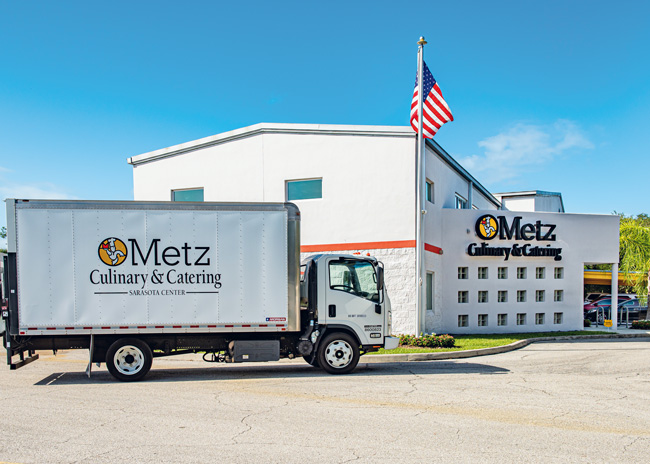 Photos by Peter Acker Photography
Photos by Peter Acker Photography
Product Arrival and Production
Food and nonfood deliveries arrive in bulk at the back door. Delivery staff drive pallets on forklifts into a bulk walk-in freezer, a bulk produce walk-in cooler, a bulk meat cooler and a dairy walk-in cooler. They also drive forklifts with pallets of dry goods to racks that hold the pallets.
A walk-in production cooler and a walk-in production freezer sit nearby, both of which hold food prepared or packaged by the center’s staff and ready for delivery to clients.
“All the refrigeration in this center, including the 20-foot-high coolers and freezers, are connected to a refrigeration rack system that has redundancy and backup so the refrigeration system is always maintained and running efficiently,” says the project’s foodservice consultant, Paul Guillaume, president, Professional Restaurants Incorporating Design & Equipment Inc., Sarasota, Fla. “This high-efficiency refrigeration system ramps up when more cooling is needed and ramps down when as much cooling isn’t needed. This cuts down on the number of compressors that would have been needed to produce this high volume of food.”
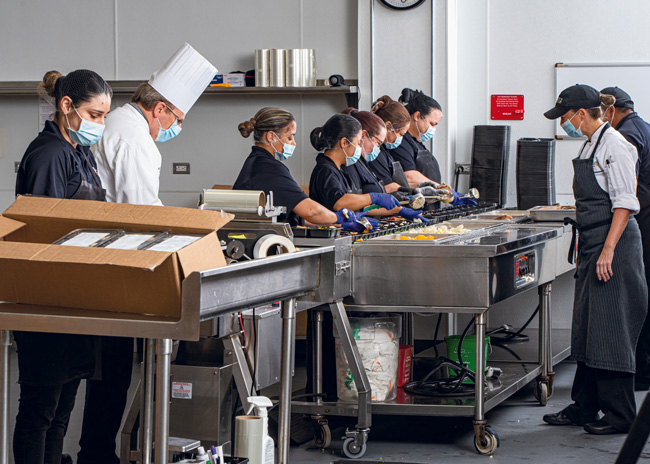 Staff assemble, package and label trays before they are placed in cardboard boxes and then chilled or frozen and sent to clients’ locations. With this system, if one of the compressors goes out, that compressor is shut down and isolated out of the system so it doesn’t corrupt the rest of the system. The system automatically contacts the service contractor. “This way, the system keeps cooling until a serviceperson arrives to repair the system,” Guillaume says.
Staff assemble, package and label trays before they are placed in cardboard boxes and then chilled or frozen and sent to clients’ locations. With this system, if one of the compressors goes out, that compressor is shut down and isolated out of the system so it doesn’t corrupt the rest of the system. The system automatically contacts the service contractor. “This way, the system keeps cooling until a serviceperson arrives to repair the system,” Guillaume says.
Staff break down pallets and take ingredients they need into production areas. Staff prepare ingredients in cold prep areas using three food slicers, several worktables, sinks and shelves. For washing fruit and vegetables, staff use a two-compartment sink containing what Thompson calls a “produce jacuzzi” that scrubs the ingredients. Staff move some ingredients into a peeler as necessary. “For example, they can wash and peel 100 pounds of potatoes in 15 minutes,” Guillaume says. “They might place the potatoes into a convection steamer and into an 80-quart floor mixer to make mashed potatoes.”
Another cold prep area contains two wall-mounted shelves, an air-powered can opener, regular can openers, several food processors including a vertical cutter mixer and a buffalo chopper, a reach-in refrigerator, two wall-mounted hand sinks, a worktable with a backsplash with an undershelf, and a garbage disposer.
Staff cut fruit and vegetables or further process it at worktables. They take ingredients for salads or that require further processing to the production cooler. Ingredients needed immediately go to the hot cooking areas.
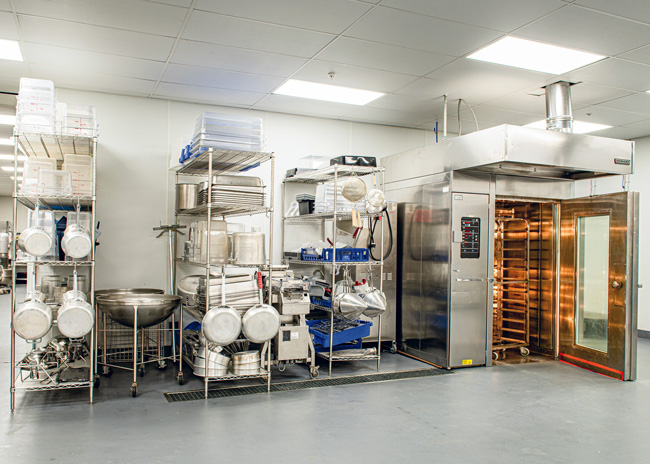 Pots, pans and other utensils have a specific storage place in the kitchen. The rotary oven cooks large quantities of proteins.
Pots, pans and other utensils have a specific storage place in the kitchen. The rotary oven cooks large quantities of proteins.
Cooklines and Packaging
One cookline includes a 36-inch, 6-open-burner range with an oven beneath for heating sauces, a pair of double-stacked convection ovens for cooking vegetables and proteins; a combi oven for cooking vegetables, proteins and pasta; and a boilerless convection steamer for cooking vegetables.
Sitting back to back with this line, another line contains a 40-gallon
tilting braising kettle for cooking pasta, spaghetti sauce, beef stroganoff, to cook bones for sauces, demi-glace for gravies and sauces; a 60-gallon steam-jacketed kettle for cooking sauces and soups; and a deep-fat fryer with built-in filtration. Combi ovens cook pasta and proteins, and two double-stacked convections heat vegetables and proteins.
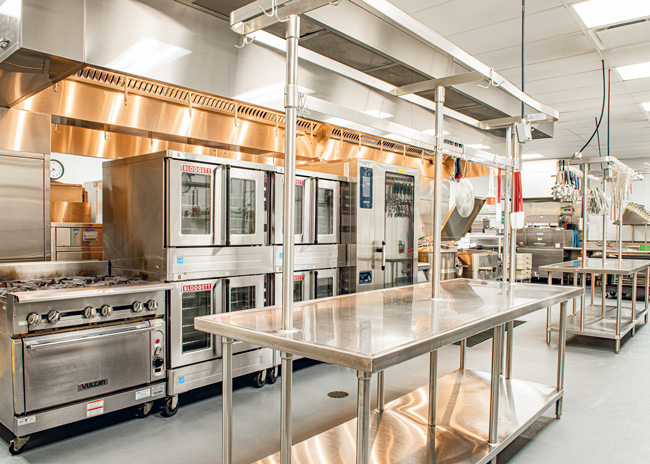 The center also contains a 36-inch countertop under-fired charbroiler, a refrigerator, a 36-inch countertop griddle and more fryers. On any given day, staff may place these pieces on the cooklines and remove other equipment. “We designed the center to have plug-and-play equipment on casters so the staff can change menus as needed,” Guillaume says.
The center also contains a 36-inch countertop under-fired charbroiler, a refrigerator, a 36-inch countertop griddle and more fryers. On any given day, staff may place these pieces on the cooklines and remove other equipment. “We designed the center to have plug-and-play equipment on casters so the staff can change menus as needed,” Guillaume says.
Exhaust hoods covering the cooking equipment regenerate and recirculate air. The HVAC demand-control ventilation system monitors the level of cooking activity and automatically instructs the exhaust fan to operate only as needed. “The double canopy vented hood operates with a computer that regulates the airflow based on the equipment beneath,” Thompson says. “The makeup air is air-conditioned, so it maintains a comfortable temperature in the room for employees.”
In order for the plug-and-play system to work, a utility distribution system was installed so equipment can run on gas, electricity and water.
A fire suppression system that includes flood coverage protects all of the equipment from end to end regardless of what equipment is around and under the hood. “The fire suppression system was designed this way to give the culinary center the flexibility to change configurations of the equipment and the menus without having to adjust the fire suppression system,” Guillaume says.
Another area contains two ice bins and an ice maker without a bin. Adjacent to storage racks for pots, pans and other utensils, a high-speed rotary oven cooks proteins. It can heat 7,000 chicken nuggets in 15 minutes.
After staff prepare hot food, they transport it to various areas, depending on its final destination. They place hot and cold bulk food into hot and cold containers. The containers then make their way into temperature-regulated delivery trucks for transporting to clients’ locations. Some food gets sent in cold and hot cabinets so it can be served from there for catered events. “We might set up a mobile kitchen with mobile sinks at each site so we can either serve food from the mobile cabinets or heat it again in mobile ovens on-site,” Thompson says.
Staff may also take hot food to a blast chiller/freezer and/or the production cooler or production freezer until it is needed for packaging.
The packaging area contains a 16-foot conveyor where staff plate cold or hot food into trays that can be heated and microwaved. A vacuum packaging machine automatically seals the trays. A staff member places nutritional labels on the film covering each tray. Staff place 25 menu items into each corrugated cardboard box and load each box onto a mobile cart and transport it into the production cooler or freezer. Meals are held for at least 48 hours before they are transported to clients, though meals have a six-month shelf life. “The chef-inspired menu items are infused with specialty spices, which cuts the shelf life to six months compared with many manufacturers whose products have a year shelf life,” Thompson says.
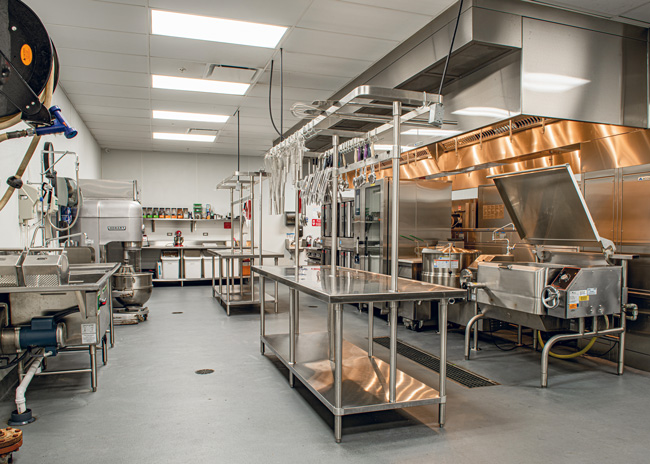 A cookline contains a tilting braising pan, a steam-jacketed kettle, a fryer, a combi oven and two double-stacked convection ovens. The 80-quart planetary mixer and vegetable wash sink sit to the left of the prep tables.Delivery trucks are kept at 35 degrees F to keep food cold or at 165 degrees F for hot food. The center’s trucks make in-state deliveries, while third-party trucks contracted by the center make out-of-state deliveries.
A cookline contains a tilting braising pan, a steam-jacketed kettle, a fryer, a combi oven and two double-stacked convection ovens. The 80-quart planetary mixer and vegetable wash sink sit to the left of the prep tables.Delivery trucks are kept at 35 degrees F to keep food cold or at 165 degrees F for hot food. The center’s trucks make in-state deliveries, while third-party trucks contracted by the center make out-of-state deliveries.
At the center, one warewashing area supports the entire facility. “A scrapping system automatically removes garbage from the pots and pans and breaks down solubles, which basically cleans the garbage and makes handling waste easier,” Guillaume says.
The area also contains a three-compartment sink, a wall-mount pot filler faucet, a high-temperature warewasher that is a rack conveyor with a condensate hood overhead, pot and pan shelving, an L-shaped soiled dish table, a clean dish table, dishrack dollies, a four-wheel dolly and a glass rack pull overshelf that prevents glasses from breaking.
The center also contains an employee lounge where staff members can relax and eat during their shifts.
As institutions and businesses ease into more regular modes of operation, the Metz Culinary & Catering facility will adjust its production to meet new demands for food. The design, which allows ease of production flow from receiving to production to packaging to shipping, supports the center well during emergency and regular situations.
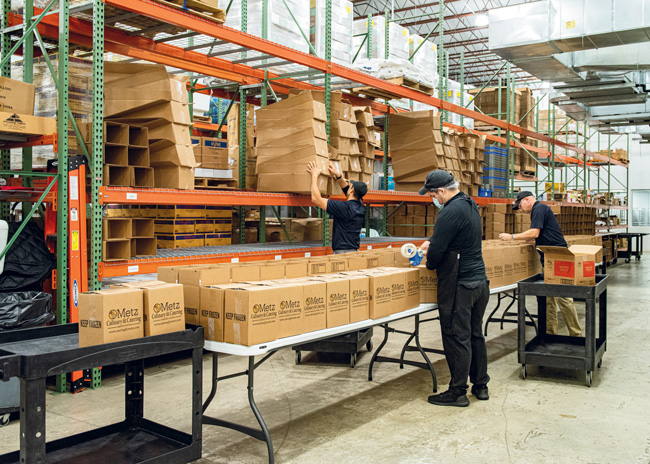 Staff organize and pack boxes with meals before placing them in delivery trucks.
Staff organize and pack boxes with meals before placing them in delivery trucks.
Facts of Note:
- Opened: Feb. 2018
- Scope of project: Gutted a manufacturing building and kept shell to build new culinary center from the ground up. The for-profit facility provides USDA-certified meals for seniors at congregate operations, home delivery and adult daycare centers, children in after-school programs, and people in need of emergency food and services. It also provides food for catering clients.
- Size: 22,000 sq. ft., including 17,000 sq. ft. for the culinary center, plus a 5,000-sq.-ft. administrative space
- Meals produced per week: 25,000 currently; almost 43,000 a day during 2020 pandemic period to support senior programs and emergency services programs
- Hours: 4 a.m. until 6 p.m., Monday through Thursday
- Menu specialties: Shelf-stable meals for emergency services provided by American Red Cross
- Staff: 34
- Website: cateringbymetz.com
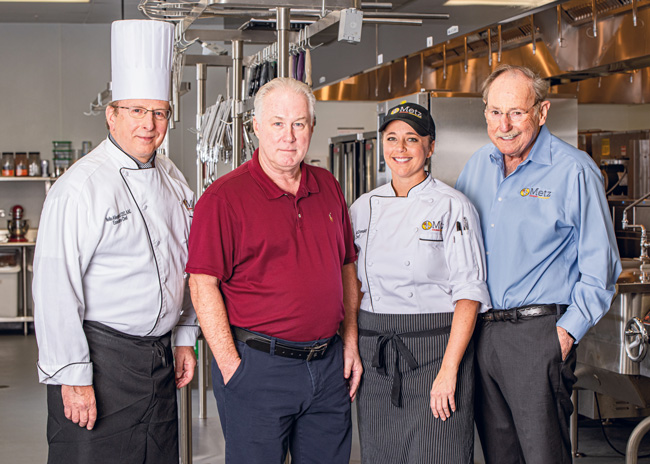 The Metz Culinary & Catering team
The Metz Culinary & Catering team
Key Players:
Ownership: Metz Culinary Management, Dallas, Penn.
Owner and chairman of the board: John Metz Sr.
General manager of site location: Dan Thompson
Catering director: Becky Souflis
Vice president of sales and business development in Florida: Jack Brill
Executive chef: Nello Allegrucci, CEC, AAC
Sous chef: Aaron Chavarria
Architect: Hoyt Architects, Sarasota, Fla.:Chris Gallagher, NCARB, partner
Foodservice consultant: Professional Restaurants Incorporating Design & Equipment Inc., Sarasota, Fla.: Paul Guillaume, president
Equipment dealer: Edward Don & Company, Fort Lauderdale, Fla.
General contractor/construction: Stellar Management, Sarasota, Fla.



